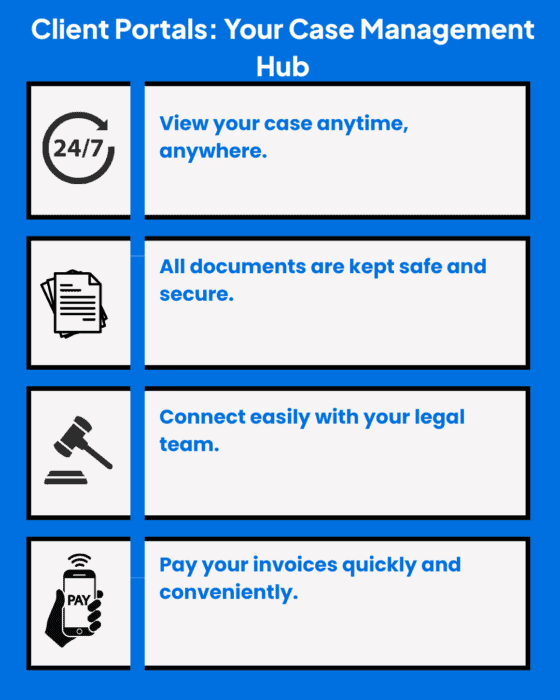
Ever been buried under a mountain of legal paperwork, wondering if there’s a better way? You’re not alone. Law firms across the country are drowning in administrative tasks that pull attorneys away from what they do best, practicing law. The traditional methods of managing cases with paper files, sticky notes, and disconnected systems are rapidly becoming relics of the past.
That’s where case management software steps in, offering a lifeline to overwhelmed legal professionals seeking more efficient ways to manage their practice.
The State of Modern Legal Practice Management
The legal industry has always been notoriously slow to embrace technological change. Many firms still cling to legacy systems and paper-based workflows despite their obvious limitations. These outdated approaches create bottlenecks that waste time, leak billable hours, and ultimately cost money.
Current Challenges in Legal Workflow
Most law firms struggle with scattered information across multiple platforms, inconsistent filing systems, and difficulty tracking time accurately. These inefficiencies don’t just create headaches – they directly impact the bottom line through missed billable hours and delayed invoicing.
When information exists in silos, collaboration becomes nearly impossible. Team members waste precious time searching for documents, recreating work that already exists, or trying to piece together case information from fragmented sources. Clio’s legal case management software offers a comprehensive solution designed specifically for law firms looking to modernize their practice and overcome these common challenges.
Let’s explore how modern case management solutions can transform your legal practice from chaotic to streamlined.
Core Benefits of Advanced Case Management Solutions
Modern law firm software delivers numerous advantages that directly address the pain points legal professionals face daily. These benefits extend far beyond simple organization, transforming nearly every aspect of practice management.
Dramatic Efficiency Improvements and Time Savings
The most immediate benefit of implementing case management software is the dramatic boost in efficiency. By centralizing all case information, documents, contacts, and communications in one accessible system, attorneys and staff save countless hours previously spent searching for information.
Consider how much time your firm currently spends on these tasks:
- Manually creating documents from templates
- Searching for client information across multiple systems
- Tracking down email communications related to specific cases
- Recording billable time after the fact (and likely missing hours)
With proper legal practice management tools, these tasks become automated or significantly streamlined. Document automation alone can save firms hours each day by automatically generating commonly used forms with client information already populated.
Enhanced Client Experience and Satisfaction
In today’s competitive legal landscape, client experience has become a key differentiator. Modern clients expect convenience, transparency, and regular communication – expectations that are difficult to meet with traditional methods.

These capabilities don’t just satisfy clients, they impress them. When clients feel informed and valued, they’re more likely to return for future legal needs and refer others to your firm.
Financial Performance Optimization
Perhaps the most compelling reason to adopt case management software is its direct impact on financial performance. These systems help capture more billable time, streamline the invoicing process, and provide insights into firm profitability.
Time tracking features allow attorneys to record time as they work, rather than reconstructing their day afterward. This seemingly small shift can recover hours of billable time that might otherwise be lost time that directly impacts a firm’s revenue.
The financial benefits of effective software extend beyond time capture to include faster payments through online billing, reduced overhead costs through paperless operations, and better financial forecasting through comprehensive reporting.
As your firm grows more efficient, you’ll also increase capacity to take on additional clients without adding staff, further improving profitability. This creates a competitive advantage that positions your practice for sustainable growth.
Key Features of Premium Legal Case Management Software
Understanding the specific features that deliver these benefits helps firms evaluate which solutions best fit their needs. Here are the core capabilities to look for in quality law firm software:
Document Automation and Management
Advanced document automation for lawyers eliminates the chaos of traditional file systems. Law firm software with strong document management capabilities allows attorneys to generate documents using templates, maintain version control with full history, obtain electronic signatures, and perform full-text searches across all files.
Additionally, secure client document sharing ensures data privacy and accessibility. These features not only streamline document workflows but also safeguard against misplacement and delays, supporting efficient legal workflow automation.
Intelligent Calendar and Deadline Management
Missing a court filing deadline can have catastrophic consequences. Modern case management solutions provide:
- Court rule-based deadline calculations
- Automated reminders
- Calendar synchronization
- Task assignments with due dates
- Mobile access to schedules
With these tools, important dates never fall through the cracks, and team members always know what requires their attention.
Comprehensive Matter Management
At the heart of any legal practice management system is its ability to organize case information effectively. The best solutions offer:
- Complete case organization and tracking
- Custom fields for different practice areas
- Relationship tracking between related matters
- Conflict checking capabilities
- Comprehensive case notes and history
These features provide a complete picture of each case, making information accessible when and where it’s needed.
Implementation Best Practices for Law Firms
Even the best software won’t deliver results if it’s not properly implemented. Firms considering case management software should follow these guidelines for successful adoption:
Assessing Your Firm’s Specific Needs
Begin by thoroughly evaluating your current workflows, pain points, and goals. This assessment should consider:
- Your firm’s size and structure
- Practice areas and specialized requirements
- Current technology capabilities
- Growth objectives
- Budget constraints
Understanding these factors helps identify the right legal practice management system that aligns with your priorities and challenges. Whether a small boutique firm or a large corporate practice, adopting cloud-based legal software tailored to specific needs ensures optimized performance and streamlined legal workflow automation.
Seamless Migration Strategies
The transition from legacy systems to modern law office software requires careful planning. Successful implementations typically involve:
- Thorough data clean-up before migration
- Phased implementation approach
- Comprehensive staff training
- Clear communication about the benefits and process
- Dedicated implementation support from the vendor
A smooth migration process preserves valuable data, maintains momentum, and encourages full user adoption. Legal professionals must ensure their chosen law firm software provider offers detailed onboarding and hands-on support throughout the transition.
Why Every Law Firm Needs Case Management Software
The legal industry isn’t known for rapid adoption of new technologies, but law firms that embrace modern legal case management solutions gain a significant competitive advantage. These legal tools do more than improve efficiency, they enhance client communication, strengthen data security, and elevate financial performance.
As client expectations evolve and competition intensifies, firms using outdated methods will find themselves at a disadvantage. Adopting a powerful legal billing solution combined with task management for law firms allows attorneys to capture more revenue and deliver outstanding client service.
FAQs
1. What kind of return on investment can law firms expect from case management software?
Most firms report ROI within 3–6 months through time savings, increased billable hour capture, faster payments, and reduced administrative costs. Many see 20–30% increases in collected revenue after full implementation, especially when using integrated time tracking for attorneys and legal billing solutions.
2. How does case management software benefit different practice areas?
Whether a practice focuses on family law, personal injury, criminal defense, or corporate law, law firm software offers customizable workflows and fields. Document automation for lawyers, client intake software, and matter management tools make legal workflow automation seamless across diverse legal disciplines.
3. What security features should firms look for in case management software?
Look for:
- Bank-grade encryption
- Secure client portals
- Role-based access controls
- Regular security audits
- Compliance with HIPAA, GDPR, and industry standards
These features ensure sensitive client data remains secure and regulatory requirements are met, critical for maintaining trust in modern cloud-based legal software environments.

